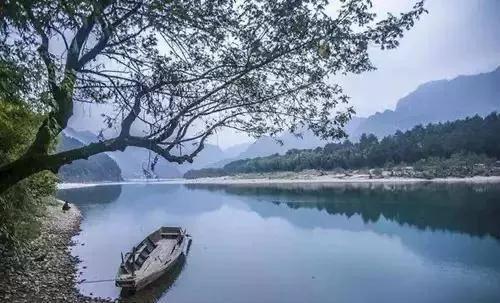Tang poetry is the treasure of the Chinese nation, poets have created brilliant and colorful Tang poetry, Tang poetry has also created countless great poets. The starry sea of poetry brings together many poets who are as brilliant as stars, and there is such a shining star, which shines in the starry sky for thousands of years, and still shines with brilliance, he is the Tang Dynasty poet Wei Yingwu.
Wei Yingwu is a very interesting person, and his difference is called strange, because he has been a problem teenager since childhood. Although he was born in a very famous noble eunuch family, he was a mischievous and domineering little goon, don't look at the age, but did a lot of bad things, gathered people to gamble, harbored criminals, flirted with women, and had a bad deed, but with the family power and Xuanzong's love for him, no one dared to move this evil minority.

The turning point of Wei Yingwu's rebirth was the Anshi Chaos, the 23-year-old Wei Yingwu, suddenly had an epiphany, perhaps social turmoil, the people did not talk about life, triggered the potential good qualities in Wei Yingwu's heart, he actually walked into the academy to start reading, and from then on, he began his other half of the gentle and erudite, Thick and kind life, after which, his poetry gradually revealed, and finally became famous all over the world, achieving an irreplaceable important position for Tang Dynasty poets.
Wei Yingwu's most famous poem is "Chuzhou Xijian", when writing this poem, Wei Yingwu was 47 years old, already very famous, at that time there was a scenic spot in Chuzhou called Xijian, in his spare time, he often came to Xijian for a walk, one day there was a feeling and hair, and wrote this "Chuzhou Xijian" that made posterity marvel.
Chuzhou Xijian
Wei Yingwu [Tang Dynasty]
The lonely grass is born on the side of the stream, and there are yellow orioles on the deep tree song.
The spring tide brings rain to the evening, and the wild ferry has no one to cross itself.
"Chuzhou Xijian" is a representative work of Wei Yingwu's landscape poetry, but also an outstanding work of Tang Dynasty landscape poetry, it seems that the author is just to record the scenery as far as the eye can see, but in Wei Yingwu's pen, the simple and ordinary scenery can become vivid and distant, full of poetic feelings, which is very different from the original unlearned and unskilled disciple, and it is even difficult to equate.
In the first two sentences, "The grass grows on the side of the stream, and there are yellow orioles singing deeply", the poet wrote that I love the lonely grass that grows in the valley of the stream, and the yellow oriole that cries in the depths of the woods. The beautiful and elegant scenery makes the poet indulge in it, and the grass, the silent deep trees, and the singing orioles are interwoven by multiple dreamlike pictures.
In the two sentences of "Alone pity the grass stream, there are yellow orioles and deep trees singing", the first sentence is written quietly, the second sentence is moving, from static to moving, so that the picture is full of life and movement. The word "single pity" is the embodiment of the author's inner feelings, and the poet has only pity for the grass that grows silently by the stream, what is the reason, perhaps because the origin of the grass is unknown, so that the poet has such a feeling.
The last two sentences, "The spring tide brings rain late to be urgent, and the wild ferry has no one to cross itself", the poet cut the end of the pen to another picture, but see, it is already evening, the spring tide rises quietly, as if with the rain surging forward, the water of the west stream suddenly becomes turbulent, the ferry port of the wilderness does not see anyone, only a small boat leisurely crosses the water.
The "late" and "urgent" in the third sentence are used quite skillfully, it seems that there is no more suitable than these two words placed here, and "spring tide with rain" has a special charm, why say "spring tide with rain", not to say "rain with spring tide", and it should be "rain with spring tide", but the poet chose the spring tide with rain, because the first to write the spring tide is more turbulent and agitated shock.
Wei Yingwu's "Chuzhou Xijian", the whole poem is written in the scene of what is seen, some people say that the poet is not sustenance or has another deep meaning, for this issue, there has always been controversy, but no matter which kind of statement is difficult to convince the public, in fact, reading poetry and appreciating poetry, you need to understand the background of the writing, but there is no need for "only the background theory", or the poet is simply amazed by the scenery, so he did it, why should posterity have to be far-fetched.
But what needs to be said is that Wei Yingwu went from a fearless and absurd teenager to a confucian and humble poet and a promising official who cared about the people, this span is so large that the author's heart must have had a turbulent experience, and this poem with such a quiet and elegant mood can reflect the author's calm and peaceful state of mind and the broad mind of the home country.